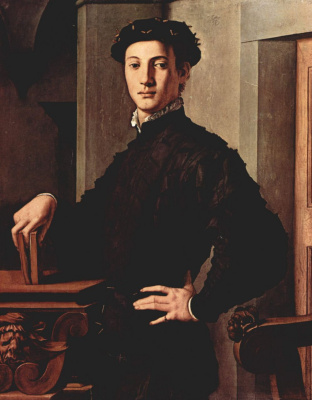Info dump
Posted: 18 Mar 2016, 12:33

I saw the idea in another thread so I've compiled some of the info dumps I have made so far as well as added a bunch of new stuff.
Major players
Seeing how so many people decided to make up military or mercenary type characters, I think I’ll run with it and steer the politicking towards things relating to the war more than I had initially thought.
The Italian War of 1521–26 pitted Francis I of France and the Republic of Venice against the Holy Roman Emperor Charles V, Henry VIII of England, and the Papal States. The conflict arose from animosity over the election of Charles as Emperor in 1519–20 and from Pope Leo X's need to ally with Charles against Martin Luther.
Georg von Frundsberg was a South German military and Landsknecht leader in the service of the Imperial House of Habsburg. An early modern proponent of infantry tactics, he established his reputation in active service during the Italian Wars under Emperor Maximilian I and his successor Charles V.
Anyone with the surname Medici. The Pope Leo X was born Giovanni di Lorenzo de' Medici, the Duke of Florence was Alessandro de' Medici, the Grand Duke of Tuscany was Cosimo I de' Medici, the Archbishop of Albi was Giuliano de' Medici, Pope Clement IV was born Giulio de' Medici. Etc etc. These guys are so rich and powerful they basically own entire cities and the church.
Andrea Gritti, the Doge (Duke) of Venice. Trying desperately to pull Venice out of a losing war his predecessor almost lost. Has a long and distinguished diplomatic and military career.
The law
Hue and cry
A common law that anyone who sees a crime being committed must shout for aid (mostly this applies to shoplifting). Anyone who hears the cry is obligated to assist in apprehending the criminal. Any who don’t assist are assumed to be an accomplice of the criminal and may share the same punishment as them (a common theme).
Eye witnesses
Eye witnesses are everything. If nobody saw you commit the crime, you most likely got away with it. There is no such thing as a crime investigation unit. On the other hand, if someone did see you and is willing to testify you are pretty much presumed to be guilty because of the laws about oaths.
Swearing oaths
Swearing under oath (in the sight of God) is a big deal, so an eye-witness testimony carried huge weight.
So much so that character witnesses were often called upon. There is no such thing as misleading or irrelevant to a court proceeding, anything and everything was relevant to trying to figure out what type of person you were (which was often more important than whether or not the crime was even committed!).
Amazingly, anyone who testified (under oath) on behalf of the accused was bound to share the same punishment as the accused if they were found guilty.
Punishment
Theft was disproportionately punished by today’s standards. It was the crime of greatest concern to the wealthy; the people who wrote the laws. The punishment was proportional to the amount stolen and NOT how much force or violence was used during the theft. First time theft of 1 lira might be a whipping. Stealing 10 lira would cost you an eye or a brand on the face. Stealing 40 lira would be a hanging. To compare, 200 lira is a roughly equivalent fine to spending 1 year is jail.
The vast majority of penalties were a combination of fine and jail time. The prisons in Venice were full to bursting so they started relying on fines a lot. They fined whatever wealth the criminal had and the criminal “paid” the remainder of the fine by doing jail time of 1yr per 200 lira they couldn’t pay. This meant the very rich often didn’t have to do jail time for terrible crimes.
The punishment for rape is to pay the woman’s father/husband/brother the value of the woman’s dowry.
Assault or assault with a weapon is punished even less severely than rape. Often a small to medium sized fine. Murder will still earn you the death penalty.
Trial by ordeal
In serious cases that had no witnesses a Trial by ordeal could take place (usually for witch-hunts but sometimes for murder trials). The judge and priests of the church would have great leeway is designing any kind of trial they liked. Common ones were Trial by Fire, Trial by Water, Trial by Combat or Trial by Jury. Usually the defendant would have to perform some task that would usually bring harm upon them (like holding a red hot metal bar) and were found to be innocent if no harm befell them.
Usually the defendant would have to ask the permission of the judge to allow them to be trialed by ordeal. The exception is that a nobleman may challenge another directly to trial by combat without a judges permission.
Dueling
The time between a challenge and the day of the duel could be many months. There is a case were the participants intentionally set a date very far away so that they could both learn to fight before the day came. Dueling was very common but illegal unless you were a noble challenging another noble. The procedure was roughly as follows:
1. A challenger who feels offended issues a public grievance
2. The defendant either a) publicly apologises for offence b) accepts the duel or c) suffers great dishonour
3. If they accept, the defendant gets to choose what weapon the duel is fought with and the challenger chooses the location and time and date (usually outside city limits at dawn)
4. Each side would have a “second” through which all communication between the parties would take place. They try to dissuade the duel from needing to take place, check the fight is fair, bear witness to the outcome and are responsible for throwing in the towel if it isn’t a fight to the death
5. Any result of the duel is considered honourable, even losing. The duel is about proving BRAVERY not skill with weapons.
Stuff I said elsewhere but I've copied over to keep it in one place
Social Status
Usually, a very rich Merchant would be a High Freeman with the Wealthy Edge. However, in Venice the rich Merchants actually take part in governing, which is usually the prerogative and power of the nobles.
So for this game, if the head of the family is a member of the Council of Forty then their entire family is equivalent to a social class of Lesser Noble since they have actual legal power. They cannot be a Greater Noble. Other non-nobles are capped at High Freeman but can take the Wealthy edge as desired. Actual Nobles by blood do not need to be on the Council of Forty to be a Lesser or Greater Noble.
Armor
As far as armor goes, I was more talking about the visibility than the protection provided when I was talking about Gamberson and Jack of Plates. Obviously if you can wear a light maille hauberk with short sleeves and no skirt people probably won't notice. If your hauberk goes down to the knees and shows bare steel, people are going to assume you are looking to start trouble.
Another thing to consider is plausible deniability and daily wear. A Jack of Plates has specifically been designed to be comfortable. If you get into an altercation and get dragged before a judge, can you really say with a straight face "I was just walking my dog, minding my own business in my maille hauberk, and from out of nowhere this guy jumps out..." The more heavily equipped you are you less likely people are going to believe you are the innocent victim.
Again I will remind this is a city campaign (a civilized area). The vast majority of NPCs are going to be wearing cloth and holding a dagger most of the time.
I don't see that much of a difference in protective quality between a "true" gambeson and a doublet, so much as the difference in what body parts they cover. A "true" gambeson covers the neck, arms, torso, groin and thighs whereas a doublet protects only the neck and torso.
Yes, if you had a "true" military gambeson (and not a fashionable arming doublet) you would face similar scrutiny as that of someone wearing mail. In any event, cloth or padded armor was commonly worn by civilians and metal was not.
Weapons
Everyone could wear a weapon of ~1.5 feet or shorter. There are countless examples. This would include Dagger, Messer, Short Sword or Buckler. The Cinquedea was particularly popular in Venice.
Owning military equipment and training in it was legal, but walking the streets with it was not.
Nobles LOVED stylizing their dress after military equipment, the doublet and rapier being the "civilian" versions of the military gambeson and longsword.
Peasants also LOVED stylizing their dress after the nobility if they could afford it. So much so that Sumptuary Laws were introduced in an attempt to stop them.
Sumptuary Laws were a lot more restrictive to women than men.
The typical penalty for breaking a Sumptuary Law was a minor fine.
Rapier is a weapon made for civilian Dueling.
Dueling was supposed to be only for nobles but was often imitated by people of lower class.
In Italy, whether or not you were a noble was a very ambiguous thing. Often rich merchant families were "elevated" to noble status if they made large enough donations.
So in theory, Rapier is supposed to be only for nobles. In practice... people probably broke this law fairly often, the law was rarely enforced and when it was enforced the penalties were not very severe.
Only firearms available is the arquebus. No pistols in the time period.














